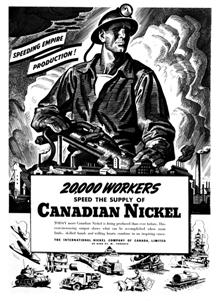In 1941 the Allied governments asked the company to increase production. International Nickel complied by committing $35 million to expand nickel output by 50 million pounds above 1940 production levels, reaching this goal by 1943 without any government subsidies. However, the Canadian government did allow the company to amortize within a five-year period, instead of ten or twenty years, $25 million worth of expansion expenditures.
That enormous task fell to American-born Ralph Parker, who at the time was the general superintendent of the mining and smelting division at Sudbury. It was one of Mr. Parker’s greatest achievements to organize the enormous program of enlarging the Sudbury mining and plant facilities without any loss of production.
To increase production of extraordinary war-time demands, Mr. Parker had to resort to “high-grading” which entails using above average ore grades and leaving behind lower grades that would have normally contributed to a longer, more profitable mine life. There was a real fear that the company would use up most of its reserves and have little to mine after the war.



























